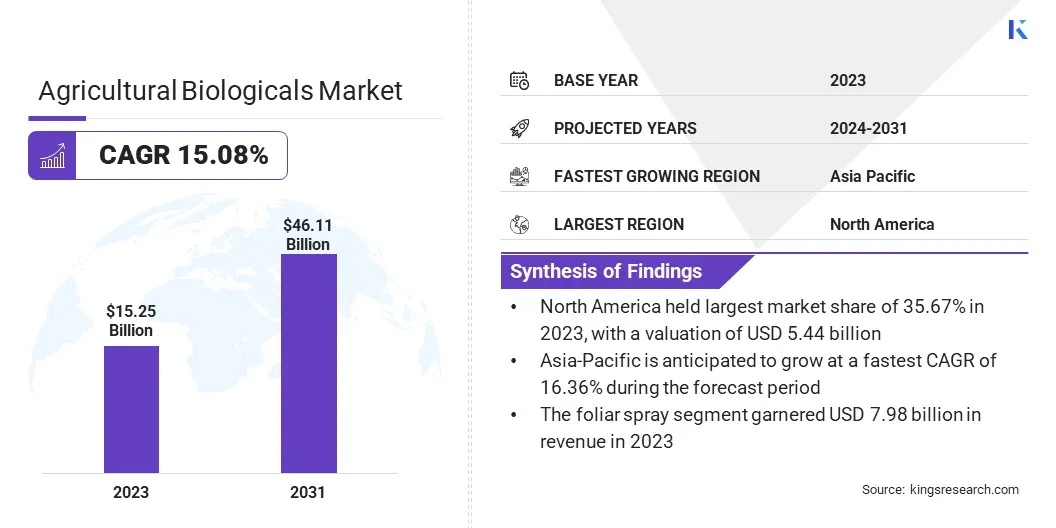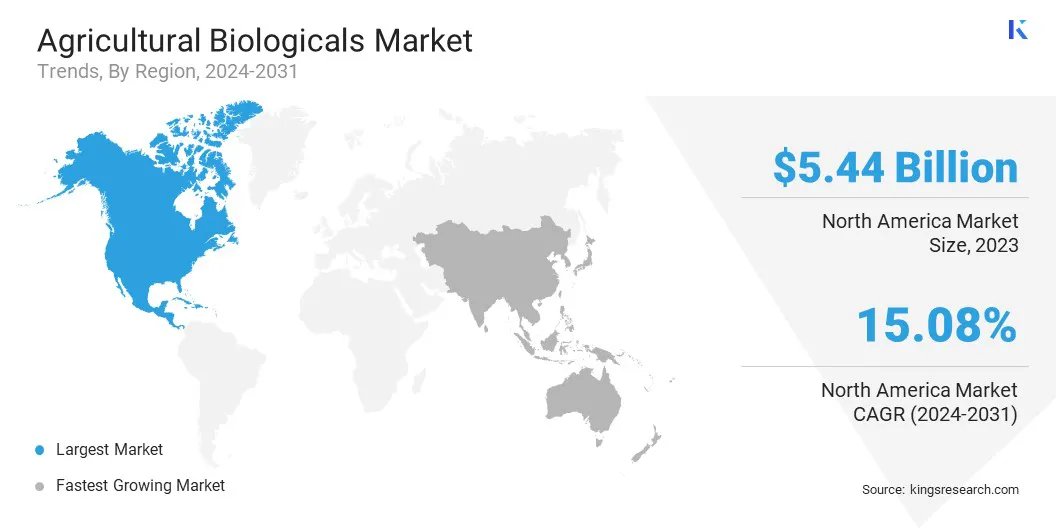Buy Now
Agricultural Biologicals Market Size, Share, Growth & Industry Analysis, By Source (Microbials, Macrobials, Natural Products, Semiochemicals), By Category (Biocontrols, Biofertilizers, Biostimulants), By Application, By Grains and Regional Analysis, 2024-2031
Pages: 170 | Base Year: 2023 | Release: December 2024 | Author: Siddhi J.
The global agricultural biologicals market size was valued at USD 15.25 billion in 2023 and is projected to grow from USD 17.25 billion in 2024 to USD 46.11 billion by 2031, exhibiting a CAGR of 15.08% during the forecast period.
The growing consumer demand for organic food, driven by increasing health-consciousness and a desire to avoid artificial chemicals and pesticides, has encouraged farmers to adopt agricultural biologicals as a sustainable alternative to conventional farming methods.
In the scope of work, the report includes products offered by companies such as Novonesis Group, Bayer Crop Science, BASF, Corteva, Valent BioSciences LLC, Koppert, UPL, FMC Corporation, Andermatt Group AG, Certis USA L.L.C., and others.
The agricultural biologicals market is characterized by a diverse range of products, including biofertilizers, biopesticides, and biostimulants, all designed to enhance crop yield, health, and resilience. These products are increasingly recognized for their environmental benefits, offering farmers sustainable solutions that reduce reliance on chemical inputs.
The market is shaped by innovations in natural-based technologies and a shift toward eco-friendlier agricultural practices. Adoption rates of agricultural biologicals vary across regions, influenced by factors such as regulatory frameworks, agricultural practices, and the level of consumer awareness.
Agricultural biologicals are natural products used in farming to protect crops, improve soil health, and promote plant growth. These include beneficial insects, bacteria, fungi, and plant extracts, which help reduce the need for chemical pesticides and fertilizers.
The market is segmented in several ways. By source, it includes products derived from natural organisms like microbes, plants, and insects. By category, it is divided into biocontrols, biofertilizers, and biostimulants. By application, it covers foliar spray, seed treatment and soil treatment.
Finally, the market is segmented by grains, focusing on specific crops which helps in tailoring biological products to optimize yield and quality.

The market is experiencing steady rise, driven by the increasing demand for sustainable farming solutions. While still developing, the market shows strong potential, with rising adoption across various regions, particularly in response to the need for eco-friendly agricultural practices.
Manufacturers in the agricultural biologicals market are increasingly focusing on innovation, product diversification, and strategic partnerships to enhance their market presence. Investment in research and development (R&D) can help create more effective and sustainable solutions.
To stay competitive, companies should emphasize strengthening distribution channels, increasing awareness among farmers, and ensuring compliance with global regulatory standards. It is also recommended to focus on providing tailored solutions for specific crops and regions, as well as collaborating with government agencies to drive adoption and market acceptance.
The growth of agricultural biologicals is closely linked to the increasing consumer demand for organic food and the push for sustainable agriculture. As consumers become more health-conscious and avoid artificial chemicals, there is a rising demand for organic produce, encouraging farmers to turn to agricultural biologicals as a natural alternative.
The biological products, such as biocontrols, biofertilizers, and biostimulants, help improve crop yield and quality which align with sustainable farming practices by reducing reliance on synthetic chemicals. This shift supports both environmental sustainability and the growing need for safer, chemical-free food options in the market.
A key challenge in the agricultural biologicals market is limited awareness among farmers, hindering widespread adoption of these sustainable solutions. Many farmers remain unfamiliar with the benefits and proper use of agricultural biologicals, which can limit their effectiveness.
To address this, extensive education and training programs are essential, including hands-on demonstrations and government-led initiatives. Providing accessible resources, workshops, and showcasing success stories can help bridge the knowledge gap, ensuring farmers understand the advantages and proper implementation of these products for enhanced productivity and sustainability.
Manufacturers in the agricultural biologicals market are expected to significantly increase investment in research and development (R&D) to create more effective, affordable, and region-specific solutions. This focus on R&D will drive the development of a broader range of products tailored to meet the needs of different crops and climates, improving the precision and effectiveness of biological solutions.
As a result, farmers will have access to more targeted products, enhancing crop yields, promoting sustainability, and making agricultural biologicals a viable option across diverse farming environments.
The growing emphasis on soil health is expected to drive increased demand for biofertilizers, biostimulants, and other biological products that enhance nutrient availability and improve soil microbiomes.
As farmers recognize the vital role of healthy soil in sustainable farming, there will be a shift toward using these products to boost soil fertility, improve crop resilience, and reduce dependency on chemical fertilizers. This trend will not only benefit crop productivity but also contribute to long-term environmental sustainability and soil conservation practices.
The global market has been segmented based on source, category, application, grains, and geography.
Based on source, the market has been classified into microbials, macrobials, natural products, and semiochemicals. The microbials segment is poised for significant growth at a CAGR of 14.96% through the forecast period.
Microbial agricultural biologicals are poised for significant market expansion, due to the increasing demand for sustainable farming practices and eco-friendly crop protection solutions. These biological products, including bio-pesticides and bio-fertilizers, offer alternatives to traditional chemical-based solutions, reducing environmental impact and promoting soil health.
As farmers seek ways to improve crop yields while minimizing chemical use, the growth of microbial agricultural biologicals is expected to accelerate, supported by favorable regulations, advancements in biotechnology, and rising consumer demand for organic products.
Based on category, the market has been segmented into biocontrols, biofertilizers, and biostimulants. The biocontrols segment led the agricultural biologicals market in 2023, reaching the valuation of USD 7.64 billion. The biocontrols category of agricultural biologicals is experiencing market expansion, due to several factors.
The growing demand for sustainable farming practices reduces reliance on chemical pesticides, which have environmental and health concerns. Biocontrols offer natural alternatives to synthetic chemicals, effectively managing pests without harming the ecosystem or beneficial organisms.
Additionally, the increasing focus on organic farming and consumer preferences for chemical-free food has accelerated the adoption of biocontrol solutions. Furthermore, advancements in technology and better efficacy at lower doses have made biocontrols more attractive to farmers, driving their widespread use in pest management systems.
Based on application, the market is categorised into foliar spray, seed treatment, soil treatment, and others. The foliar spray segment secured the largest revenue share of 52.34% in 2023. The use of foliar sprays for the application of agricultural biologicals is expanding, due to their effectiveness in delivering nutrients and protection directly to the plant leaves.
This method allows for faster absorption of bioactive ingredients, by bypassing the soil and targeting the plant where it needs protection or growth enhancement. The demand for foliar spray segment is driven by its ability to improve crop yields, especially in cases of nutrient deficiencies or pest outbreaks.
Additionally, the growing demand for sustainable farming practices, along with the increasing adoption of precision agriculture, has made foliar sprays a popular choice, offering efficiency and minimizing the impact on the environment.
Based on region, the global market is classified into North America, Europe, Asia Pacific, Middle East & Africa, and Latin America.

North America accounted for 35.67% share of the global agricultural biologicals market in 2023, with a valuation of USD 5.44 billion. North America is the leading region for agricultural biologicals, driven by advanced farming techniques and a strong focus on sustainability.
The region has a well-established regulatory framework that facilitates the approval and use of biopesticides, biofertilizers, and biostimulants. This, combined with a growing consumer demand for organic and chemical-free food, has increased the adoption of agricultural biologicals among farmers.
Additionally, substantial investments in R&D by both public and private sectors are fostering innovation in biological products. The region’s commitment to eco-friendly solutions and high awareness of environmental impacts further solidify its dominance in the market.
The agricultural biologicals market in Asia Pacific is poised for significant growth over the forecast period at a CAGR of 16.36%. Asia Pacific is expected to be the fastest-growing region for agricultural biologicals, due to its rapidly expanding agricultural sector and increasing demand for sustainable farming practices.
Countries like China, India, and Japan are major agricultural producers, where the need for enhanced crop protection and soil health is growing amid challenges like pesticide resistance and environmental degradation.
With a rising preference for organic farming and government initiatives promoting eco-friendly agricultural solutions, there is a significant shift toward adopting biological products. Moreover, improving awareness, increased investment, and supportive policies are driving the rapid growth of agricultural biologicals in the region.
The global agricultural biologicals market report will provide valuable insights with an emphasis on the fragmented nature of the market. Prominent players are focusing on several key business strategies such as partnerships, mergers and acquisitions, product innovations, and joint ventures to expand their product portfolio and increase their market shares across different regions.
Strategic initiatives, including investments in R&D activities, establishment of new manufacturing facilities, and supply chain optimization, could create opportunities for the market growth.
Key Industry Developments
The global agricultural biologicals market is segmented as:
By Source
By Category
By Application
By Grains
By Region
Frequently Asked Questions